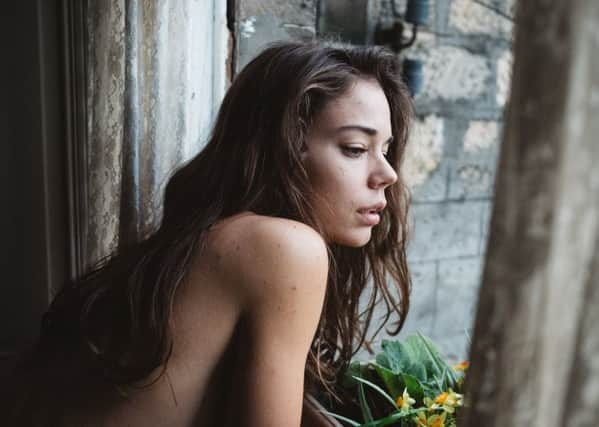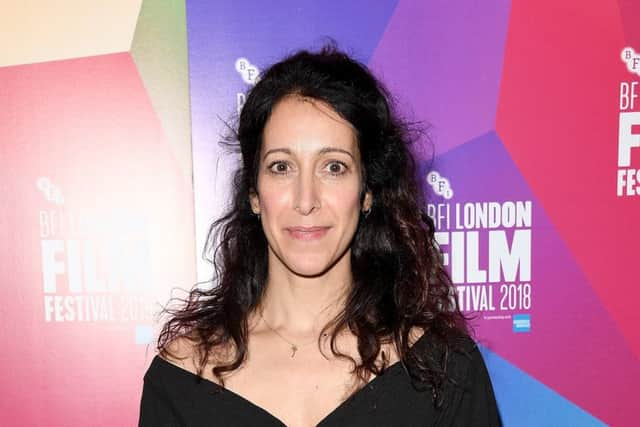Writer-director Harry Wootliff on her new Glasgow-set movie, Only You


‘I love being in Glasgow,” says Only You writer/director Harry Wootliff. On the phone from London ahead of her debut feature’s Glasgow Film Festival premiere later this week, the Leeds-born filmmaker isn’t just proclaiming her affection for the city out of politeness for her imminent host. The screening itself will mark something of a homecoming for the film, which Wootliff shot in Glasgow, making great use of its most vibrant neighbourhood to present a side of the city not often seen on film.
“We shot it in Finnieston,” says Wootliff, who embedded herself and her cast in the area in an effort to capture the feel of neighbourhood that in recent years has become one of the hippest parts of the UK (largely thanks to cheap rents and the proliferation of cutting-edge bars, restaurants, coffee shops and pop-up galleries). “I live in London, but everywhere in London is very different and where you live kind of becomes your bit of London. I think that’s what I wanted to do with Glasgow.”
Advertisement
Hide AdAdvertisement
Hide AdNot that she’s comparing the two. As she says: “A lot of cities seem to be aping London, but Glasgow just has its own thing going on.” But she has captured a more international and culturally dynamic side of the city, one that its residents see everyday, but which filmmakers intent on using Glasgow only as an off-the-peg signifier for depravation and violence have largely ignored. Watch Only You – which revolves around a young couple whose relationship is tested by their struggle to conceive – and it becomes immediately apparent that there’s no reason why Glasgow shouldn’t also be a backdrop for a modern relationship drama, one made with the kind of intimacy and emotional honesty found in American independent films, European art house cinema or the work of British auteurs such as Andrew Haigh (45 Years) and Joanna Hogg (Unrelated).


That idea was really the starting point for Wootliff. “I wanted to write a relationship story – a love story – that felt really intimate and real. I wanted to do something that was about the endurance of love through the ups and downs of staying together after the initial falling-in-love phase is over.”
This plays out in the story of Spanish arts worker Elena (Laia Costa) and PhD student Jake (Josh O’Connor), who meet by chance on Hogmanay, fall instantly for each other, then gradually find biology getting in the way of their chemistry when they decide to try for a baby. “I thought the problem of them not being able to conceive a baby was really interesting,” says Wootliff. “It’s still such a taboo subject and something people don’t really discuss with other people when they’re going through it.”
As it happens, it’s a subject with which Wootliff had some personal experience. “At the time I was also trying to conceive and hadn’t had a baby yet,” she says, “although by the time we shot the film I actually had a two-year-old that had been a surprise conception.”
The film certainly feels honest in its depiction of the emotional and physical toll trying for a baby can take, especially when embarking on IVF treatment. “Physically and mentally, that cycle of hope and disappointment is what I wanted to capture,” says Wootliff, who also took care not to make the age-difference between Elena and Josh (she’s 35, he’s 27) too much of an issue. Though they joke about it early in the film, it’s irrelevant when it comes to their attraction for each other and isn’t treated like the ticking clock of a biological time-bomb.
“What’s more important than the sense of time [running out] is the constant threat that it will never happen,” says Wootliff. “I think once you’ve embarked on a journey of thinking you want a baby, you can’t ever leave it behind without there being a massive grieving process. Elena is not that old, and I didn’t want it to be a cliché of a woman leaving it too late or a woman desperate to meet a man because she’s desperate to have a baby. It was really important to me that it’s Jake that pushes the idea at the beginning and then it becomes a shared desire that puts a constant pressure on them.”
As two of the rising stars of European arthouse cinema, Costa and O’Connor also brought a lot to the film. Wootliff had loved Costa’s breakthrough performance in Victoria and felt the same way about O’Connor’s in God’s Own Country. “It was important that their relationship was sexy and vibrant because not being able to conceive desexualises people,” says Wootliff, who decided to shoot some of the film in sequence so they could do all the scenes of the characters falling in love first and the heart-wrenching stuff that makes up the second part of the film later.
“It was incredible to see how different they were. They were very playful the first week and I just thought that was how they always are on set. But the second week they were a lot more serious. They were really just embracing the feeling of where they were in the relationship. To create that in such a genuine way takes a massive amount of focus and energy.”
Advertisement
Hide AdAdvertisement
Hide AdFocus and energy is something Wootliff knows all about too. It’s been 15 years since her debut short, Nits, won a slew of awards and marked her out as a filmmaker to watch. Though she’s written for television in the years since, it’s only now that her directing career is taking off, with her next film – starring Ruth Wilson – tentatively set to shoot this autumn. “It’s taken a bloody lifetime,” she says. Is that down to the way the industry is set up, or is it to do with the systemic sexism that, historically, has seen male filmmakers rise through the ranks faster? “I don’t know why. There’s definitely sexism. You’re also kept in development for a long time. People don’t want to let you go, but they don’t want to commit either. Hopefully there won’t be such a long break this time.”
Only You screens at Glasgow Film Festival on 22 February and will go on general release in the summer